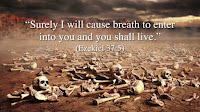I have heard and preached the story of the “dry bones” many times. Never has it seemed more appropriate and more profound than when I read it this week. Ezekiel was a priest and prophet who lived about 500 years before Jesus. He lived in a critical time— when the majority of the Hebrew people (including Ezekiel) were exiled to Babylon. In the beginning of the book, Ezekiel was warning people about the invasion that was to come. He called on people to change. However, once Israel was defeated and the people were scattered to foreign lands, his tone change. There was more comfort and hope. Ezekiel’s primary audience became the people who were displaced, cut off from their homeland. The vast majority of people would not live to see their homes. They would die in a foreign land. Some of their descendants might return, but many would not. The exile lasted approximately 70 years. That is a very long time to be cut off from your homeland, from your people, and even your place of worship. They didn’t even have facebook!
We Wait: March 29, 2020
March 29, 2020
Year A, Lent 5 Ezekiel 37:1-14
Our reading for today comes near the end of the Book of Ezekiel and provides a vision of hope, that it is truly a vision. It was a valley of dry bones. Some assume this valley was full of the bones of people who had died in battle. However, I think that the valley of bones represented not the dead, but the living, the people who had lost so much. We only hear the voice of the bones after they have been given life. After they are restored to life they say, “Our bones are dried up and our hope is lost; we are cut off completely.” These are not the bones of the dead, but of the living. One commentator wrote, “Everything they had trusted, everything that had given their lives shape and meaning, was gone…” For this group, that was their land, their homes, their communities and their holy city, the place where God resided. That is a great loss indeed. It is no wonder that they felt as though they were cut off completely.
Even in the places that have been affected most severely by the coronavirus, people are not quite as cut off as the Hebrew people were. But there have been people who have lost their homes, lost their jobs and have been cut off from family and friends and many who have lost their lives. People have died alone, or lived knowing their loved ones are dying. For those of us who are fortunate enough not to have lost those things, we still mourn the smaller losses because they don’t feel like small losses. Our children and young adults have lost out on their last few months of school. Some will not be able to graduate. Many of us feel lost without a job to go to and a schedule to follow. I find myself mourning my loss of a schedule and routine. As I considered this particular loss, I could not help but wonder if I have given far too much meaning to my job and routine. Is that where meaning resides, in what I do day to day? Do we have to be busy to have a purpose in life? I feel like this is an opportunity to consider where we find meaning in our lives. Our meaning is not in what we do, but who we are.
Even the most fortunate of us are facing hardship right now. We are being asked to make sacrifices, not merely for us, but for the good of the community. This is a time we must be patient. Our Psalm says, “I wait for the Lord; my soul waits for him; in his word is my hope.” Right now, we wait and we make small sacrifices so that this virus will lose some of its power. Ezekiel waited until Jerusalem was destroyed to share this vision of hope, this knowledge that no matter how difficult things get, no matter how much we feel we are cut off, God never forgets us.
While we may feel as though our bones are dried up and life as we have known it is changed forever…we still have life in us. There is still meaning and purpose in this life. So we wait. We pray. We live, because no matter how suffocated we may feel, God breaths for us. God’s Spirit is with us. Then when the worst is past (and it will pass) we will rebuild a better country and world—where we find meaning not in the success of our economy or the might of our army, but in the people we love and the world that God has entrusted to us.

